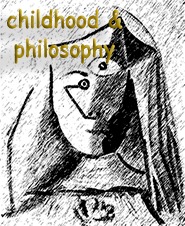algumas implicações éticas de praticar filosofia com crianças e adultos
DOI:
https://doi.org/10.12957/childphilo.2021.61025Palavras-chave:
filosofia para crianças, ética, infância.Resumo
Este artigo serve de introdução a um dossiê centrado nas implicações éticas da Prática da Filosofia com Crianças e com pessoas adultas. Identifica temas éticos no movimento FpC ao longo de três gerações de teóricos e praticantes, e argumenta que, histórica e materialmente, a transição para uma "nova" hermenêutica da infância que se produziu dentro do movimento FpC pode ser uma resposta à pressão sempre crescente do neoliberalismo e de um capitalismo armado para construir políticas públicas na educação sobre uma super-regulamentação. Um novo relacionamento com a infância poderia proporcionar a agenda ética e política que nossos tempos exigem para fazer filosofia com as crianças com integridade? Poderia uma escuta e uma abertura radical à infância - que tem sido uma característica intrínseca da pedagogia de FpC desde o início - sustentar o movimento através destes tempos sombrios? Finalmente, o texto apresenta um conjunto de artigos escritos em resposta a estas perguntas: Quais deveriam ser, se houver, os compromissos éticos do facilitador de FpC? A neutralidade política/ideológica é exigida do facilitador do FpC? A neutralidade política é possível? O que constitui doutrinação em ambientes educacionais? As crianças são mais vulneráveis à doutrinação do que os adultos e, em caso afirmativo, quais são as implicações desse fato para a prática de FpC? Quais são os usos do FpC no cenário ideológico dramaticamente polarizado em que vivemos atualmente? Quais, se houver, são as responsabilidades éticas de um professor ou professora envolvido em práticas filosóficas? As responsabilidades éticas do praticante filosófico são semelhantes ou diferentes quando os sujeitos são crianças ou adultos? Toda metodologia tem um "currículo oculto"? Se sim, o que é o currículo oculto do FpC? O que distingue a prática dialógica da prática monológica? Uma pode ter a aparência da outra? O "método socrático" (Elenchus), como o concebemos, é dialógico? Quais, se houver, são os usos da ironia na prática filosófica? Sócrates (ou qualquer outro filósofo) deve ser considerado um modelo para os praticantes de PpC?
Downloads
Referências
A Nation at Risk: The Imperative for Educational Reform (1983). Wikipedia. https://en.wikipedia.org/wiki/A_Nation_at_Risk, last edited on 26 March 2021, at 17:46 (UTC).
Arendt, Hannah (1958). The human condition. University of Chicago Press.
Arendt, Hannah (1961), The crisis in education. In Between past and future, Chapter 5. London: Penguin Classics.
Barber, Benjamin R. (2004). Strong democracy: Participatory politics for a new age. Oakland: University of California Press.
Breaux, Aimee. & Smith, Zachary Oren (2019). Greta Thurnberg took a Tessla to Iowa: Here’s what she had to say. Iowa City Press-Citizen. https://www.press-citizen.com/story/news/2019/10/04/greta-thunberg-speech-transcript-iowa-climate-strike/3868695002/
Chetty, Darren. Racism as ‘Reasonableness’: Philosophy for children and the gated Community of Inquiry. Childhood & Philosophy 13, 2018.
Deal, Terrence E; Nolan, Robert R (1978). Alternative schools: Ideologies, realities, guidelines. Chicago : Nelson-Hall.
Deleuze, Gilles., & Guattari, Felix. (1987). A thousand plateaus. B. Massumi, Trans. University of Minnesota Press.
Democratic Schools (2020). Wikipedia.https://en.wikipedia.org/wiki/Democratic_education. And (http://www.idenetwork.org),
Dewey, John (1907). The school and society. Chicago: University of Chicago Press.
Elicor, P. philosophical inquiry with indigenous children: an attempt to integrate indigenous forms of knowledge in philosophy for/with children, Childhood & Philosophy 2019.
Gregory, Maughn (2011). Philosophy for children and its critics: A Mendham dialogue. Journal of Philosophy of Education 45(2)
Han, Byung-Chul (2020). The Burnout Society. Redwood City CA: Stanford University Press.
Kellett, Mary (2021), Voice, Participation, and Agency. Oxford Bibliographies, Childhood Studies.https://www.oxfordbibliographies.com/view/document/obo-9780199791231/obo-9780199791231-0013.xml
Kennedy, David (2017). An archetypal phenomenology of skhole. Educational Theory 67, 3: 273-289.
Kennedy, David (forthcoming 2021). Schooling the new sensibility: Communal philosophical dialogue, play, and social democracy. In Petr Urban and Alice Koubová, Eds. Play & democracy: Philosophical perspectives. London: Routledge.
Landauer, Gustav ( 2010). Revolution and other writings: A political reader. Gabriel Kuhn Ed. & Trans. Oakland, CA: PM Press.
Lenin (1901) What is to be Done. E-Book https://www.marxists.org/archive/lenin/works/1901/witbd/
Masschelein, Jan and Simons, Maarten (2013). In defense of the school: A public issue, Jack McMartin Trans. Leuven, Belgium: Education, Culture & Society.
Matthews, Gareth 1994) The Philosophy of Childhood. Cambridge, MA: Harvard University Press.
Mbembe, A. (2019) Necropolitics. Duke: Duke University Press.
McCowan, Tristan (2010). Prefigurative approaches to participatory schooling: Experiences in Brazil. In Cox, Sue, Dyer, Caroline, Robinson-Pant, Anna & Schweisfurth, Michele (Eds). In Children as decision-makers in education: Sharing experiences across cultures. New York: Continuum.
Oser, Fritz K.; Althof, Wolfgang; & Higgins-D'Alessandro, Ann (2008). The just community approach to moral education: System change or individual change? Journal of Moral Education 37, 3(Sept): 395-415.
Raths, Louis (2020). Values Clarification. https://louisraths.wordpress.com/values-clarification-2/.
Tolstoy, Lev (1899). What Shall We Do? https://www.gutenberg.org/files/38690/38690-h/38690-h.htm.
United Nations (1959), Declaration of the Rights of the Child (originally drafted for the League of Nations in Geneva, Switzerland 1934).
Wall, John (2021). The Childism Institute: http:/childism.org
Zuboff, Shoshana. (2019). The age of surveillance capitalism. New York: Public Affairs.




